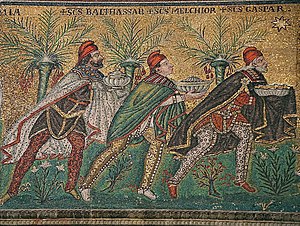
Today is Epiphany. It is one of those church holidays that has morphed over time to become what is known in some parts as “Three Kings Day”. Originally something else, it is now the day we honor the “Wise Men” or “Three Kings”. Unfortunately, we celebrate without the hint of irony that comes with getting the entire story backward.
The Birth Story
The place of the three wise guys is folded into the Christmas story in virtually every telling. In fact, the announcement of pregnancy, the travel to Bethlehem, the birth, and the arrival of three dudes with presents is all wrapped into a single story. That story is then treated as simultaneously innocuous (as in “look at the cute little baby!”) and the only means for eternal salvation (as in Jesus’s time on earth is entirely irrelevant, as His death is all that matters). The very real and grittiness is scrubbed out of this season to allow us to feel glossy and happy.
Epiphany is not about the birth. In fact, it’s origins had nothing to do with the wise guys, but with the baptism of Jesus. That’s right: we skipped from birth to Jesus getting dunked in just 12 days! Now, we save that until we’re in the season of Epiphany. The day itself has become about the Magi.
The Magi
Everyone who studies the Bible gets a very rude awakening when dealing with this story. We are used to these religious images of kings, with crowns, expensive clothes, and riding camels, showing up at the stable (?) with these presents on the night Jesus was born. The text reads nothing like that. Neither does it infer anything like that. What it says is quite the opposite.
These guys that show up are not kings or “wise” men, but astrologers. Yes, those astrologers [and this is my kind]. Not philosophers, but people seen by and large as quacks and frauds. These are the “wise men” sent to find Jesus.
Which begs the question of why we tell this story so wrong. It has to be more than scrubbing away the grime and grit. This is calling these people the very wrong thing. Sort of.
The truth is that these astrologers truly are wise. Wise to GOD, rather than to the world. The world wouldn’t call them wise. The world think they’re fools. And, let’s be clear, the world includes the Jewish leadership.

Think of Shakespeare’s plays and how the fool, the jester, and even the crazy, are the ones gifted with true vision. Everyone else is corrupted and blind (sometimes literally), but the fools are given the gift of seeing things for how they truly are.
These fools are the people in the story that get it, and reject the majority and the authority. They bring gifts, rather than weapons (to kill the baby boy). The fools are the ones who are truly wise.
My trouble with our telling of the story is that this is so essential to their character. It isn’t that even kings bow to Jesus (perhaps one reason we think of the fools as kings), but that the earthly kings were blinded from seeing Jesus; that fools and outcasts have real vision.
When we, instead, shortcut to call the fools wise, we skip the most essential step: the part in which we see what true wisdom involves. It allows the earthly powerful to maintain their power and the earthly wise to be seen as wise, when this incredible moment reveals that to be totally false.
Today we celebrate fools. For it is in fools that GOD entrusts the real Kingdom.
Leave a Reply